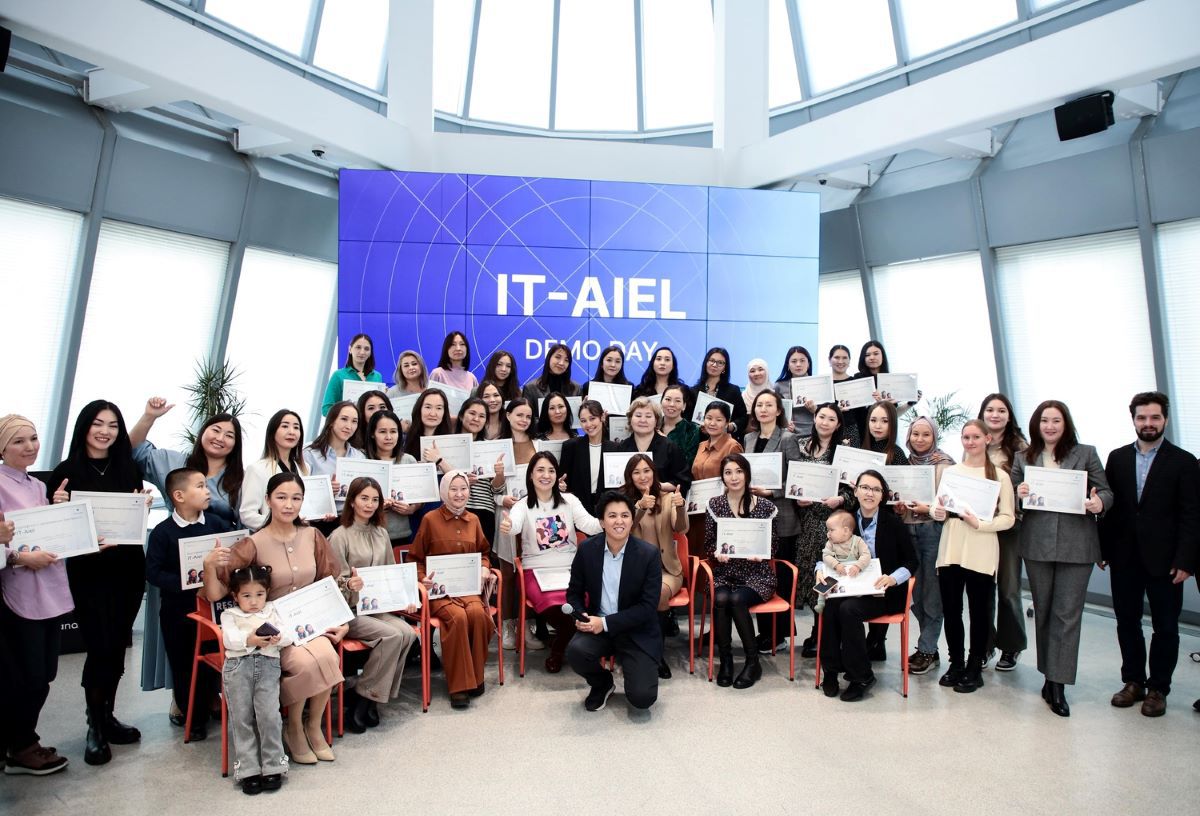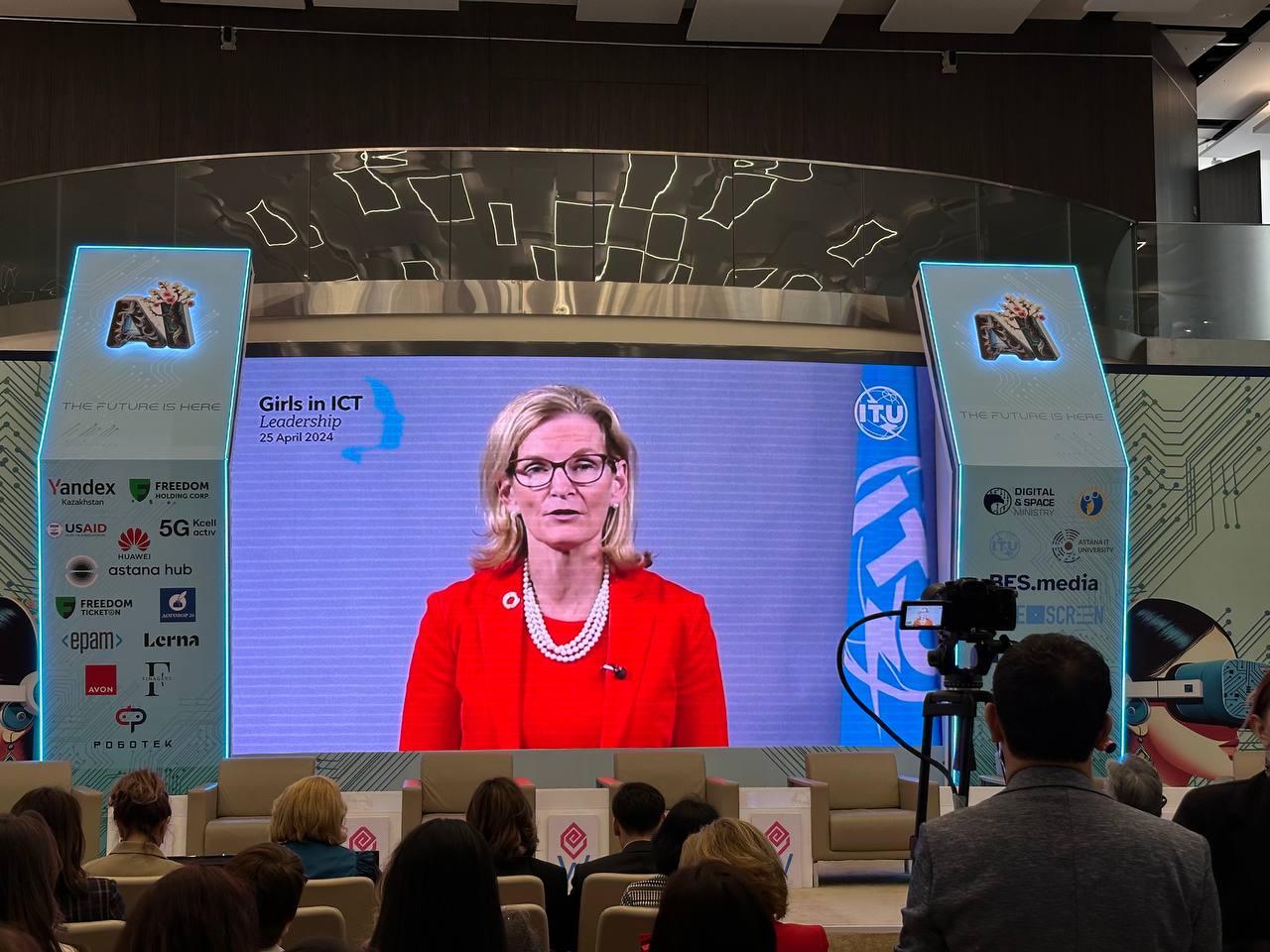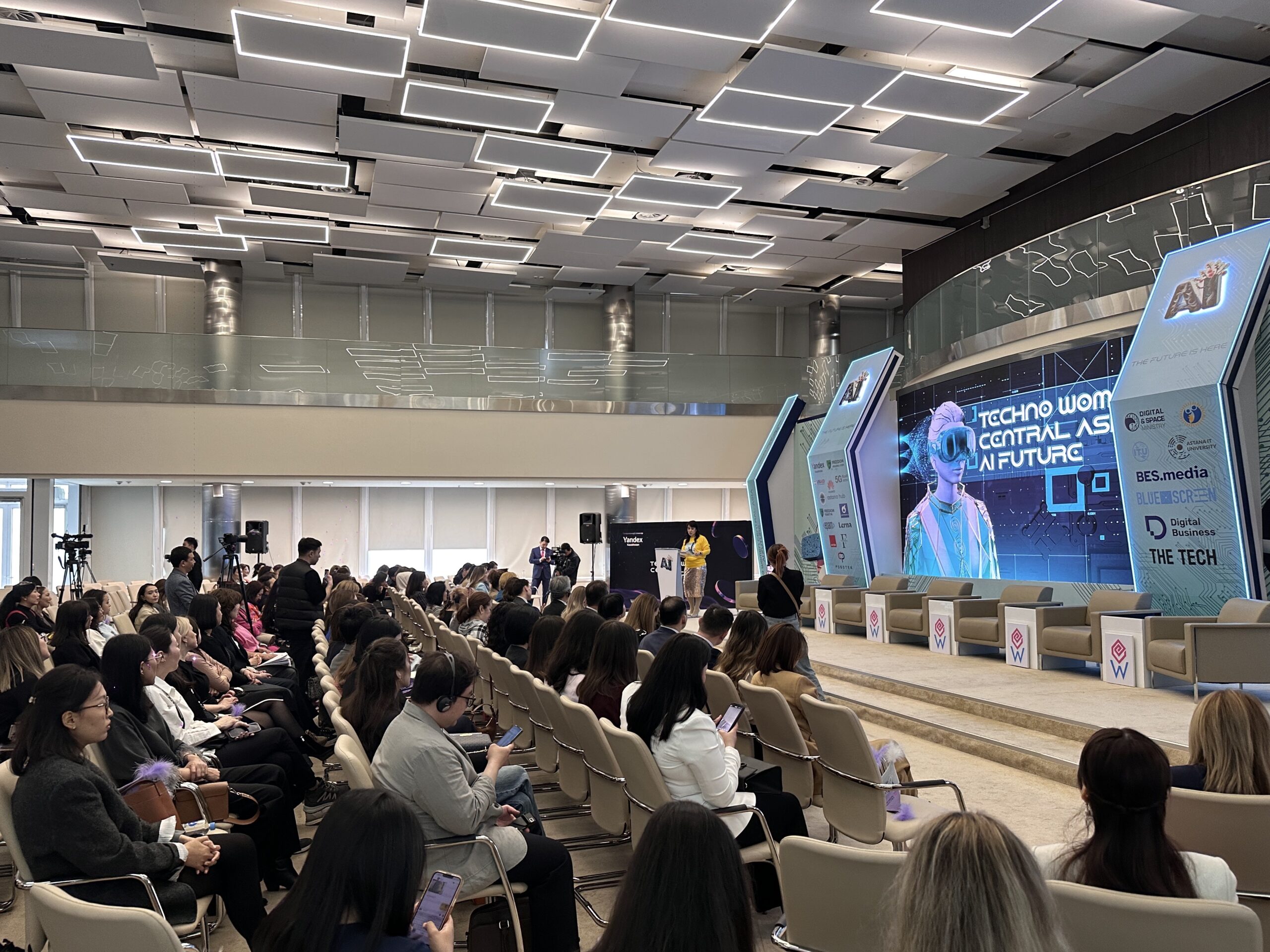ASTANA – The TechnoWomen Artificial Intelligence (AI) Forum presented the key aspects of the AI development agenda on April 18 in Astana. On the second day of the forum, international experts and private sector representatives outlined the priorities of digital transformation.

Photo credit: The Astana Times.
The high demand for AI in the market indicates the need to create a professional industry community for analysis, regular cooperation, and exchange of experience. In that sense, TechnoWomen not only expands opportunities in the digital landscape but unites and empowers women in technology.
Women’s empowerment in Kazakhstan’s digital transformation
“When we first started implementing the idea of TechnoWomen several years ago, there were approximately 50-70 participants in the room. Today, we can proudly say that TechnoWomen has become a Central Asian movement,” said Aziza Shuzheyeva, the chairwoman of TechnoWomen, a non-profit organization aimed at empowering women in technology-related fields.

The AI development underscores the importance of establishing a professional industry community to coordinate common initiatives in Central Asian countries in the long run. Photo credit: The Astana Times.
Shuzheyeva delivered the speech on behalf of Kazakh Minister of Culture and Information Aida Balayeva, who was unable to attend due to the emergency situation resulting from massive flooding. Amidst the latest developments in the country, TechnoWomen also announced a humanitarian fundraiser for schoolchildren from the flood-affected regions.
Minister Balayeva is the chairwoman of the National Commission for Women’s Affairs, Family and Demographic Policy. The commission, which marked its 25th anniversary a month earlier, pays particular attention to female empowerment in the IT sector.

The IT-Aiel program included free courses, such as No Code School, Freelance School, and Computer Literacy Fundamentals. Photo credit: digitalbusiness.kz.
“The commission is spearheading a series of IT projects, providing support to the Astana Hub International Technopark of IT startups. To enhance digital skills and competencies among women and girls, we initiated the establishment of TechnoGirls clubs at universities and colleges. By 2030, IT is expected to become a mainstream profession for women,” said Shuzheyeva, reading out Balayeva’s address.
One of the commission’s projects in action is IT-Aiel. The program provided 2,000 unemployed women with the skills to boost their income and achieve financial independence. Through comprehensive training, female representatives were equipped with the knowledge and tools necessary to thrive as freelancers on digital platforms.
AI bridging the gender digital divide
Each year, the fourth Thursday in April marks the International Girls in Information and Communications Technology (ICT).

Video address of International Telecommunication Union (ITU) Secretary-General Doreen Bogdan-Martin. Photo credit: The Astana Times.
In her online address, International Telecommunication Union (ITU) Secretary-General Doreen Bogdan-Martin said that a “shared digital future needs women leaders who are not just technologically skilled, but visionaries with a voice to advocate for a more inclusive, equitable and sustainable world, online and offline.”
This year, the ITU is focused on leadership, and how the international community can support women and girls everywhere to become leaders in science, technology, engineering, and mathematics.
“As we continue to witness unprecedented digital transformation, with the rise of AI and other emerging technologies, we simply cannot afford to keep leaving half the world’s population behind,” said Bogdan-Martin.
Speaking about the critical need to increase female leadership, she presented statistics on women’s employment in AI.
“Right now, just 21% of all ICT ministers are women and only 32 out of 165 ICT regulators are led by a woman. In the highest positions of government, gender equality will not be reached for another 130 years,” she said.
“In the private sector, women technologists occupy less than a third of positions and face a pay gap of 21%. Just 22% of AI workers globally are women. The hiring rate of women in tech leadership roles has stalled,” she added.
The conference is a very meaningful one “as part of a very important agenda,” said Yoo-Taek Lee, executive dean of International Schools at Woosong University, in an interview with The Astana Times.
“There is no gender in technology. Obviously, women can contribute even more significantly so that we can develop a more female-focused profession,” said Lee.
The professor highlighted the importance of promoting young IT specialists on a global scale. They need to be exposed to global competition because the domestic space is too limited for this area, he noted.
“Governments can’t lead all the research and develop technology, so they need to support entrepreneurs, foster cooperation, and encourage the younger generation to participate in this development process. In that sense, they need to create specific platforms and infrastructure,” said Lee.
High energy consumption in AI development
High energy consumption is inevitable in the development of AI systems, particularly those that involve training large neural networks or running complex algorithms.
Deputy CEO of Huawei Technologies Kazakhstan Farida Toleubayeva explained the computational demands required for training and inference processes. The company is now focused on digitization of the energy sector.

Participants of the forum. Photo credit: The Astana Times.
“In the past, shovel-wielding workers profited during the gold rush period. Today, it is the iron producers who thrive in the AI boom. AI heavily relies on hardware equipment housed in data centers, which consume colossal amounts of electricity,” she said.
“Now, the global community is calling for responsible energy consumption. There are certain tools for transitioning from traditional systems to newer ones. This includes the development of renewable energy sources that can provide an additional boost for AI development,” added Toleubayeva.
TechnoWomen about practical solutions with AI
As part of the panel discussion, TechnoWomen members shared their perspectives on implementing AI systems in their work.
According to KazPost CEO Assel Zhanassova, utilizing technology enables a comprehensive view of company management.

The forum will last through April 19. Photo credit: The Astana Times.
The head of the national postal service highlighted the development of daily AI and supply chain management.
“We implement technologies to optimize channels through ready-made applications or to process automation in back-office functions, for example, accounting. Data collection requires a lot of time,” said Zhanassova.
“Logistics companies have many dynamic assets, such as trucks, couriers, operators, postal workers, letters, and newspapers. All assets that need to be tracked,” she noted.
In this regard, the timely adoption of technologies is crucial, as any delays could lead to customer loss, ultimately “favoring those who are best prepared to succeed.”
For more than 15 years, Marzhan Orazmukhamedkyzy has been working in telecommunications. She is now the director of transformation of the network division at Kazakhtelecom, the largest telecommunication company in Kazakhstan.
Orazmukhamedkyzy has been involved in large-scale national projects, including initiatives to provide broadband access to rural areas and the 250+ program. Launched in 2020, the program’s key objective was to provide villages with a population of over 250 people with the internet. By 2025, Kazakhstan aims to provide 100% of the population with the internet.
“Currently, I work on digital transformation projects, process automation, and data-driven approaches. Our people are accustomed to high quality. The consumer is now quite demanding when it comes to the quality of communication. The foundation of all our information and communication services is fiber optic communication. All information and communication services and mobile communication are based on fiber optic cables,” said Orazmukhamedkyzy.
In the aftermath of devastating floods nationwide, the Kazakh government is now developing digital tools to improve flood forecasting and instructed a swift launch of a service for accepting claims for compensation for damage caused by floods.
